
Indian Wedding Jewlery
Dive into the dazzling world of Indian wedding jewelry! Explore the rich tapestry of tradition, craftsmanship, and stunning designs that make these pieces more than just accessories—they are heirlooms that tell a story of culture and heritage.

Unveiling the Enchantment of Indian Wedding Jewelry
Jewels of Tradition
Indian weddings are a grand celebration of love and commitment, steeped in rich traditions that date back centuries. Among these traditions, the jewelry worn by the bride holds a special place, weaving together the threads of heritage, artistry, and familial bonds. Traditional Indian wedding jewelry is not merely ornamental; it serves as a powerful symbol of a woman’s marital status and the cultural richness of her roots. In this blog, we delve into the world of traditional Indian wedding jewelry, exploring the significance and stories behind the stunning pieces—from the regal Maang Tikka to the intricate Haar—that adorn a bride on her wedding day, making her look nothing short of a queen in her own right.
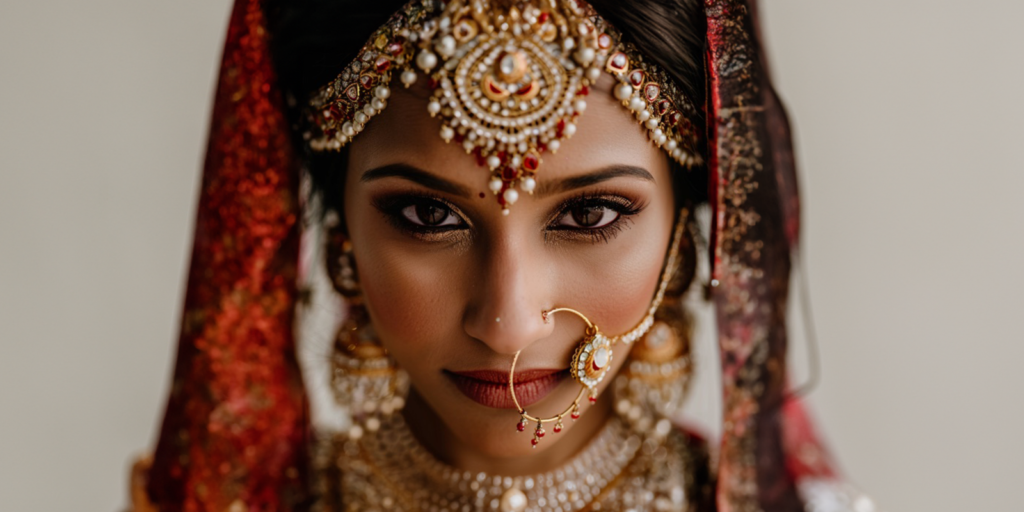
Maang Tikkas and Hennas
Embellishing Brides with Tradition and Blessings
The maang tikka, a quintessential ornament in Indian bridal attire, is more than just a piece of jewelry; it is a symbol steeped in tradition and cultural significance. Traditionally worn on the wedding day, this elegant accessory dangles gracefully on the bride’s forehead, positioned to rest at the sixth chakra, the ajna or the seat of concealed wisdom. The maang tikka is typically crafted from precious metals like gold or silver and is often embellished with a variety of gemstones such as diamonds, pearls, or rubies to match the bridal ensemble. Its design and materials not only enhance the bride’s beauty but also invoke blessings of wisdom and marital bliss. This ornament represents the union of male and female and is believed to ward off evil and promote a harmonious married life, making it a profound addition to the bridal adornments.
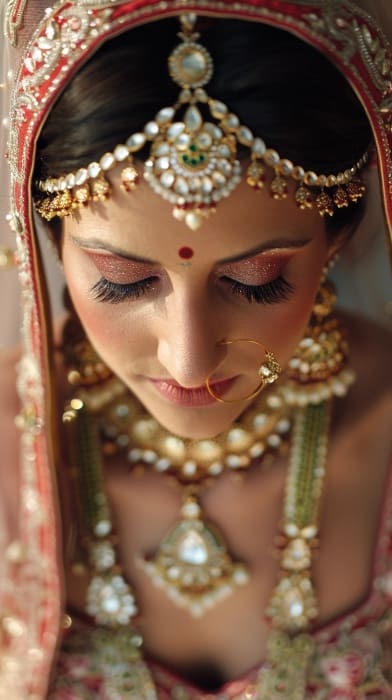
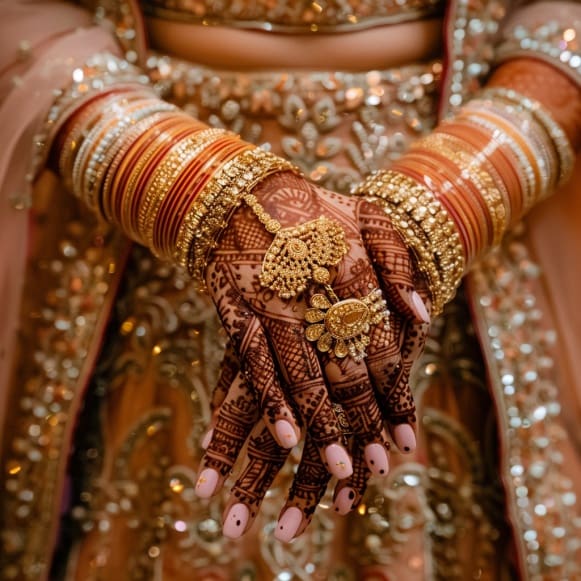
Henna, or Mehndi, holds a cherished place in Indian weddings, symbolizing joy, beauty, and spiritual awakening. Applied during a pre-wedding ceremony, the intricate patterns are drawn on the hands and feet of the bride using a paste made from the powdered leaves of the henna plant. This natural dye imparts a rich, reddish-brown color, which deepens over time and is believed to bring good luck and prosperity. The designs often incorporate motifs of flowers, peacocks, and paisleys, each carrying specific meanings and blessings for the couple’s new journey. Traditionally, the darkness of the henna stain is said to represent the strength of the bride’s relationship with her future spouse and mother-in-law. This beautiful art form is not only a way for the bride to express her dreams and aspirations through symbolic decorations but also serves to protect against evil spirits, making it an essential and meaningful part of the Indian bridal experience.
Mangalsutras, Jhumkas, and More Jewelry
Diving Into the Deep Symbolism of Indian Bridal Jewelry
Mangalsutras and jhumkas are traditional ornaments that hold profound significance in Indian bridal attire. The mangalsutra, a sacred necklace made of black beads and gold, is tied around the bride’s neck by her groom as a symbol of their marriage and commitment. It is considered a protective talisman that wards off evil and signifies the longevity of the husband’s life. This ornament is central to many Indian wedding ceremonies, representing not just a marital bond but also a prayer for the couple’s health and prosperity. On the other hand, jhumkas, or dangling earrings, are cherished for their iconic bell-shaped design. These earrings are typically crafted in gold and often embellished with gemstones, pearls, or intricate filigree work. Jhumkas echo the celebratory spirit of Indian weddings and are worn by brides to complement their overall ensemble while adding a touch of timeless elegance. Both mangalsutras and jhumkas are emblematic of Indian cultural heritage, encapsulating the grace and sanctity of matrimonial union.
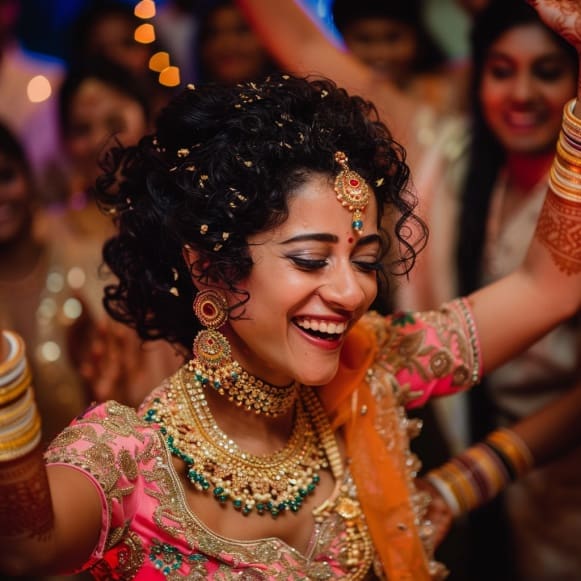
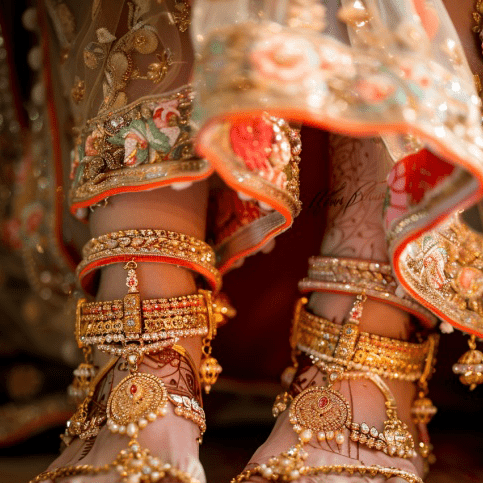
Bangles, kadas, and payals are essential elements of traditional Indian bridal jewelry, each carrying significant cultural and symbolic meanings. Bangles, usually made of gold or glass, are worn in multiples on both arms and are believed to represent good fortune and prosperity. The clinking sound they make is thought to ward off negative energy, ensuring the bride’s protection. Kadas are thicker, often more ornate bangles, sometimes set with precious stones, symbolizing strength and resilience in the marital relationship. Payals, or ankle bracelets, are delicate chains adorned with small bells, crafted in silver or gold, which chime sweetly with the bride’s movements. This not only accentuates the beauty of her steps but also serves as a traditional sign of her arrival into her new home. These ornaments are worn not just for their aesthetic appeal but also for their auspicious attributes, playing a vital role in the visual and spiritual tapestry of Indian weddings.
Golden Glamour and Gemstone Grace
How Indian Brides Shine on Their Wedding Day
Gold jewelry is not only a staple but a statement of opulence and auspiciousness in Indian bridal attire. Revered for its intrinsic value and timeless appeal, gold is traditionally worn by brides to symbolize prosperity, good fortune, and fertility. From intricate necklaces and heavy bangles to ornate earrings and waistbands, each piece is richly crafted, often incorporating motifs that are culturally significant such as lotuses, peacocks, and gods. The prominence of gold in Indian weddings also stems from its role as a form of financial security and a treasured family heirloom, passed down through generations. This radiant metal reflects the sun’s light, believed to imbue the wearer with warmth and a glowing presence on their monumental day. By adorning themselves in gold, Indian brides not only embrace their cultural heritage but also visually express hopes for a prosperous and enduring marriage.
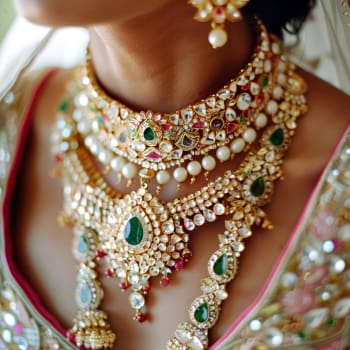
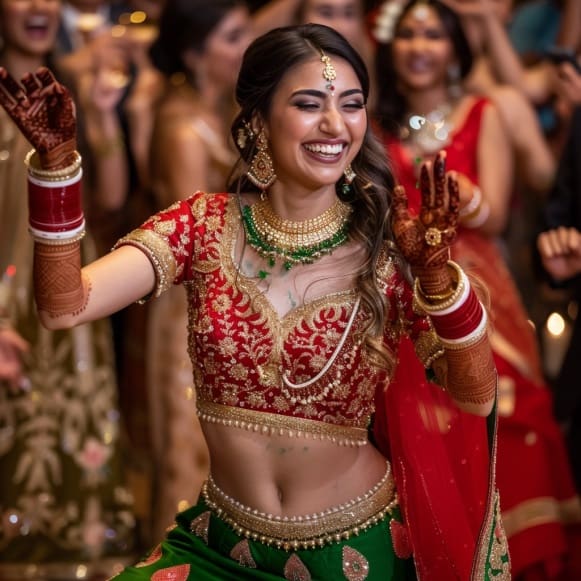
Gemstones such as emeralds, rubies, and pearls hold a place of honor in Indian bridal jewelry, each adding its own layer of meaning and beauty to the wedding attire. Emeralds, with their lush green hues, are believed to symbolize fertility and new beginnings, making them a popular choice for brides stepping into a new phase of life. Rubies, striking in their fiery red color, are thought to represent passion and love, enhancing the emotional intensity of the occasion. Pearls, with their soft iridescence, symbolize purity and innocence, adding a touch of grace and elegance to the bridal look. These gemstones are often set in intricate designs of gold or silver, creating a luxurious display of craftsmanship that not only beautifies but also serves to protect the bride with their various auspicious properties. Wearing these gemstones is a way for brides to carry forth the blessings of their culture while presenting themselves in regal splendor on their wedding day.
Celebrating Indian Bridal Jewelry
Embrace the legacy of Alfred Van Cleef, the visionary behind Van Cleef & Arpels, who artfully combined supreme craftsmanship with innovative design, from exquisite gemstones to the patented Mystery Set technique. If Alfred Van Cleef’s story sparks in you a passion to challenge conventional boundaries or to blend traditional elegance with contemporary innovation, My Jewelry Repair is here to make your vision a reality. Let us be your partner in crafting a piece of jewelry that doesn’t merely decorate but tells the unique story of your personal journey of sophistication and innovation, continuing the legacy of creativity and transformation.

Check Out the Magic of Our Jewelry Services!
Resources:
- 13 Top & Best Indian Wedding Jewellery Trends for 2024:https://www.sadibyah.com/
- A COMPLETE GUIDE TO INDIAN WEDDING JEWELRY:https://www.linandjirsa.com/a>

The mangal sutra is a significant symbol in Indian culture and Indian brides, representing the sacred bond of marriage.